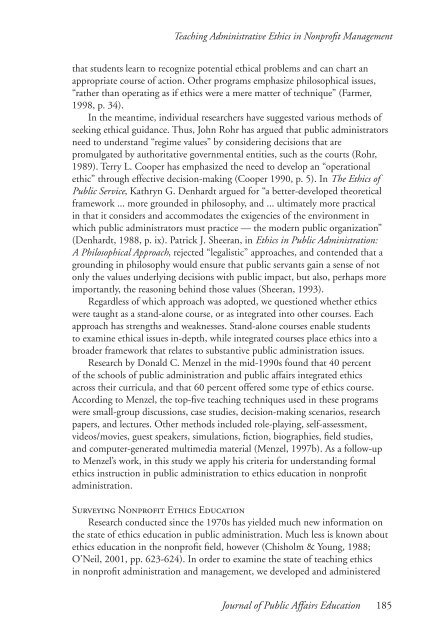JOURNAL OF PUBLIC AFFAIRS EDUCATION - Naspaa
JOURNAL OF PUBLIC AFFAIRS EDUCATION - Naspaa
JOURNAL OF PUBLIC AFFAIRS EDUCATION - Naspaa
You also want an ePaper? Increase the reach of your titles
YUMPU automatically turns print PDFs into web optimized ePapers that Google loves.
Teaching Administrative Ethics in Nonprofit Managementthat students learn to recognize potential ethical problems and can chart anappropriate course of action. Other programs emphasize philosophical issues,“rather than operating as if ethics were a mere matter of technique” (Farmer,1998, p. 34).In the meantime, individual researchers have suggested various methods ofseeking ethical guidance. Thus, John Rohr has argued that public administratorsneed to understand “regime values” by considering decisions that arepromulgated by authoritative governmental entities, such as the courts (Rohr,1989). Terry L. Cooper has emphasized the need to develop an “operationalethic” through effective decision-making (Cooper 1990, p. 5). In The Ethics ofPublic Service, Kathryn G. Denhardt argued for “a better-developed theoreticalframework ... more grounded in philosophy, and ... ultimately more practicalin that it considers and accommodates the exigencies of the environment inwhich public administrators must practice — the modern public organization”(Denhardt, 1988, p. ix). Patrick J. Sheeran, in Ethics in Public Administration:A Philosophical Approach, rejected “legalistic” approaches, and contended that agrounding in philosophy would ensure that public servants gain a sense of notonly the values underlying decisions with public impact, but also, perhaps moreimportantly, the reasoning behind those values (Sheeran, 1993).Regardless of which approach was adopted, we questioned whether ethicswere taught as a stand-alone course, or as integrated into other courses. Eachapproach has strengths and weaknesses. Stand-alone courses enable studentsto examine ethical issues in-depth, while integrated courses place ethics into abroader framework that relates to substantive public administration issues.Research by Donald C. Menzel in the mid-1990s found that 40 percentof the schools of public administration and public affairs integrated ethicsacross their curricula, and that 60 percent offered some type of ethics course.According to Menzel, the top-five teaching techniques used in these programswere small-group discussions, case studies, decision-making scenarios, researchpapers, and lectures. Other methods included role-playing, self-assessment,videos/movies, guest speakers, simulations, fiction, biographies, field studies,and computer-generated multimedia material (Menzel, 1997b). As a follow-upto Menzel’s work, in this study we apply his criteria for understanding formalethics instruction in public administration to ethics education in nonprofitadministration.Surveying Nonprofit Ethics EducationResearch conducted since the 1970s has yielded much new information onthe state of ethics education in public administration. Much less is known aboutethics education in the nonprofit field, however (Chisholm & Young, 1988;O’Neil, 2001, pp. 623-624). In order to examine the state of teaching ethicsin nonprofit administration and management, we developed and administeredJournal of Public Affairs Education 185
















